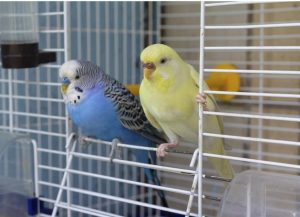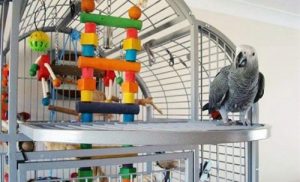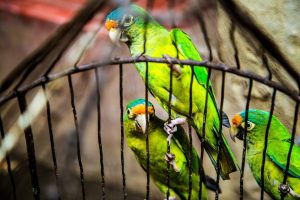Welcoming a parrot into your home is both exciting and deeply rewarding. These intelligent, colorful birds quickly become part of the family, but ensuring their happiness and health begins with one essential step—designing the right cage environment. A thoughtfully arranged cage not only keeps your parrot safe and comfortable but also provides the stimulation and space they need to thrive.
This guide covers everything you need to know about creating the perfect cage setup for your feathered friend.
1. Picking the Right Cage Size and Shape
Parrots come in all sizes, and their cages should reflect that. As a rule: the bigger the cage, the better. Your parrot should have enough room to stretch its wings, climb, and play without restriction.
- Small parrots (Budgies, Lovebirds): At least 18x18x24 inches
- Medium parrots (African Greys, Amazons): At least 24x36x48 inches
- Large parrots (Macaws, Cockatoos): At least 36x48x60 inches
Always opt for a rectangular cage instead of a round one, since round cages can confuse birds and limit movement. Look for horizontal bars for easier climbing, and make sure bar spacing is appropriate to prevent accidents or escape.
2. Choosing the Best Spot in Your Home
Where you place the cage makes a big difference in your parrot’s well-being. Parrots are social but also need to feel secure.
- Keep cages away from drafts and direct sunlight
- Place them at eye level to encourage bonding and reduce anxiety
- Avoid kitchens due to dangerous fumes (like Teflon)
- Quiet corners of busy rooms such as living or family rooms are ideal
3. Essential Cage Accessories
A great cage setup goes beyond food and water bowls—it should keep your parrot entertained and engaged. Include:
- Perches: Use different textures (wood, rope, plastic) and diameters to strengthen foot muscles
- Toys: Rotate weekly to prevent boredom and provide mental stimulation
- Bowls: Secure, easy-to-clean dishes for food and water
- Ladders & Swings: For climbing, playing, and exercise
- Foraging Toys: Encourage natural behaviors by hiding treats in puzzles
Arrange items at different levels, keeping most accessories elevated since parrots prefer higher spaces.
4. Keeping the Cage Clean
Hygiene is essential to your bird’s health. A dirty cage can quickly lead to infections and stress.
- Daily: Replace food and water, clean droppings
- Weekly: Change liners, wash dishes, wipe surfaces
- Monthly: Deep clean the entire cage with bird-safe disinfectant
Making cleaning part of your routine ensures a consistently healthy environment.
5. Lighting and Sleep Routine
Parrots thrive with a steady day-night rhythm. Natural light is best, but avoid direct sunlight. Indoors, full-spectrum lighting can mimic daylight.
Parrots need 10–12 hours of quiet, dark rest each night. Use a breathable cage cover or move the cage to a quiet space at bedtime.
6. Temperature and Humidity Control
Most parrots feel comfortable in 65–80°F (18–27°C). Avoid sudden changes in temperature.
- Keep away from air vents and open windows
- Use a humidifier in dry climates, especially during winter
- Watch for signs of discomfort like fluffed feathers or labored breathing
7. Out-of-Cage Time and Social Interaction
Even the best cage setup isn’t enough on its own. Parrots need daily interaction and time outside the cage for exercise and bonding.
Spend time playing, training, or simply talking with your parrot. Providing a play stand or bird-safe area outside the cage can make these moments more enjoyable.
8. Safety First
Parrots are curious explorers, so safety is non-negotiable.
- Ensure latches and doors are secure
- Avoid toys with sharp edges or loose strings
- Never use sandpaper perches or galvanized metal (zinc risk)
- Keep toxic plants and chemicals far away
Conclusion
Designing the perfect cage setup for your parrot is one of the best investments you can make in their well-being. A safe, stimulating, and well-kept environment ensures your feathered companion enjoys a long, healthy, and happy life.
Remember: your parrot’s cage isn’t just a home—it’s their world. Fill it with love, enrichment, and care, and your bird will reward you with years of joy and companionship.
For more expert tips on parrot care, visit joeparrots.com or reach out to our team—we’re always happy to help fellow parrot enthusiasts.



